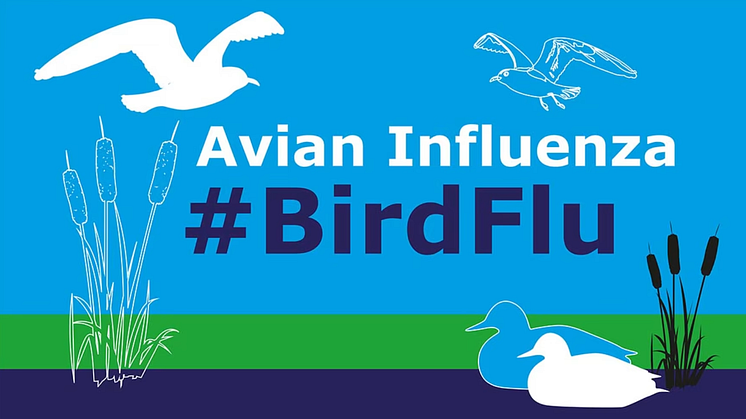
Press release -
Avian Influenza: new national measures for bird keepers
In a joint statement the Chief Veterinary Officers for England, Scotland and Wales said:
Bird keepers have faced the largest-ever outbreak of avian flu this year and with winter brings an even more increased risk to flocks as migratory birds return to the United Kingdom.
Scrupulous biosecurity and hygiene measures is the best form of defence, which is why we have declared an Avian Influenza Prevention Zone (AIPZ) across Great Britain, meaning that all bird keepers must take action to help prevent the disease spreading to more poultry and other domestic birds.
The introduction of an AIPZ means regardless of whether you keep a few birds or thousands, you are legally required to meet enhanced biosecurity requirements to protect your birds from this highly infectious disease.
Keepers with more than 500 birds will need to restrict access for non-essential people on their sites, workers will need to change clothing and footwear before entering bird enclosures and site vehicles will need to be cleaned and disinfected regularly to limit the risk of the disease spreading. Backyard owners with smaller numbers of poultry including chickens, ducks and geese must also take steps to limit the risk of the disease spreading to their animals.
The introduction of an AIPZ follows a decision to raise the risk level for avian influenza incursion in wild Birds in Great Britain from ‘medium’ to ‘high’. For poultry and captive birds, the risk level has been raised from ‘medium’ to ‘high’ at premises where biosecurity is below the required standards, and from ‘low’ to ‘medium’ where stringent biosecurity measures are applied.
The nationwide AIPZ builds on the additional biosecurity measures that were brought in last week as part of the regional housing order which covers Norfolk, Suffolk, and parts of Essex. The AIPZ, now in force across Great Britain, does not include a nationwide requirement to house birds. However, this is being kept under constant review.
There has been a prolonged season of avian influenza this year and with the now increased risk during the winter, the need to include a mandatory housing requirement in the AIPZ may arise. Further disease control measures will be based on the latest scientific evidence and veterinary advice.
The new AIPZ means all bird keepers across Great Britain must:
- Keep free ranging birds within fenced areas, and that ponds, watercourses and permanent standing water must be fenced off (except in specific circumstances e.g. zoo birds).
- Clean and disinfect footwear and keep areas where birds live clean and tidy.
- Minimise movement in and out of bird enclosures.
- Reduce any existing contamination by cleansing and disinfecting concrete areas, and fencing off wet or boggy areas
- Keep domestic ducks and geese separate from other poultry.
- Ensure the areas where birds are kept are unattractive to wild birds, for example by netting ponds, and by removing wild bird food sources.
- Feed and water your birds in enclosed areas to discourage wild birds.
- Register as a keeper of birds in the borough of Bury
- https://www.gov.uk/guidance/avian-influenza-bird-flu
- https://www.gov.uk/guidance/avian-influenza-bird-flu#public
Keepers should familiarise themselves with our avian flu advice and report suspicion of disease to APHA on 03000 200 301.
The avian influenza prevention zone will be in place until further notice and will be kept under regular review as part of the government’s work to monitor and manage the risks of bird flu.
Dead wild birds may be infected so do not touch them unless wearing suitable protective clothing. When found on publicly owned land and a decision is taken to remove them, it is the local authorities’ responsibility to safely dispose of the carcases as animal by-products.
Poultry keepers and members of the public should consult our latest guidance to check the latest threshold for reporting dead wild birds to the Defra helpline on 03459 33 55 77 and not touch or pick them up. Where not required for testing they should be disposed of safely.
Poultry and captive bird keepers are advised to be vigilant for any signs of disease in their birds and any wild birds and seek prompt advice from their vet if they have any concerns.
Lesley Jones, Director of Public Health for Bury Council, said: " I want to reassure residents that the risk to public health from avian flu is very low.
"However, it is important that people do not pick up any sick or dead birds to avoid spreading the virus, which can affect humans in rare cases.
"If you do find any dead swans, geese or ducks or other dead wild birds while out and about, please report them to the Defra helpline on 03459 33 55 77.
"I would also urge bird keepers to be vigilant for any signs of disease and report any suspected cases to their nearest Animal and Plant Health Agency (APHA office).”
The Animal and Plant Health Agency (APHA) carries out year-round avian influenza surveillance of dead wild birds submitted via public reports and warden patrols. The APHA will collect some of these birds and test them to help us understand how the disease is distributed geographically and in different types of bird, not all birds will be collected.
Avian influenza is in no way connected to the COVID-19 pandemic which is caused by the SARS-CoV-2 virus which is not carried in poultry.
More information
How to spot avian influenza (bird flu), what to do if you suspect it, and measures to prevent it: https://www.gov.uk/guidance/avian-influenza-bird-flu
Advice to the public: https://www.gov.uk/guidance/avian-influenza-bird-flu#public
Topics
Categories
Regions
Find us on: Facebook.com/burycouncil, Flickr.com/buryphotos. @burycouncil and bury.gov.uk


